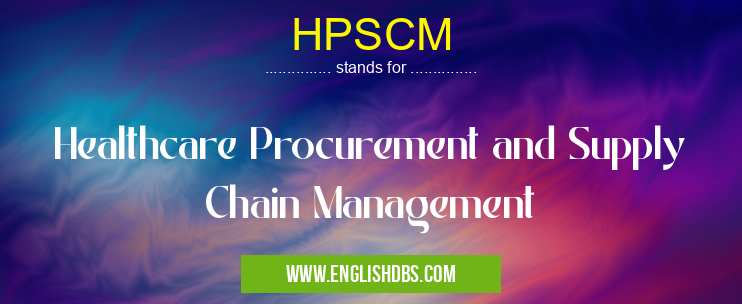What does HPSCM mean in MANAGEMENT
HPSCM stands for Healthcare Procurement and Supply Chain Management. It is a specialized field of supply chain management that focuses on the unique challenges and opportunities of the healthcare industry. HPSCM professionals are responsible for planning, implementing, and managing the flow of goods and services to and from healthcare providers, including hospitals, clinics, and long-term care facilities.

HPSCM meaning in Management in Business
HPSCM mostly used in an acronym Management in Category Business that means Healthcare Procurement and Supply Chain Management
Shorthand: HPSCM,
Full Form: Healthcare Procurement and Supply Chain Management
For more information of "Healthcare Procurement and Supply Chain Management", see the section below.
» Business » Management
Key Responsibilities
HPSCM professionals typically have the following responsibilities:
- Strategic planning: Developing and implementing supply chain strategies that align with the overall business goals of the healthcare organization.
- Procurement: Managing the acquisition of goods and services from suppliers, including negotiating contracts and ensuring compliance with regulatory requirements.
- Logistics: Planning and managing the transportation and storage of goods and materials.
- Inventory management: Maintaining optimal inventory levels to minimize costs and ensure availability.
- Performance management: Monitoring and evaluating the performance of the supply chain and identifying opportunities for improvement.
Benefits of HPSCM
Effective HPSCM can provide numerous benefits to healthcare organizations, including:
- Reduced costs: By optimizing the procurement process and managing inventory efficiently, HPSCM can help organizations reduce their operating expenses.
- Improved quality: By ensuring the supply of high-quality goods and services, HPSCM can help organizations improve patient care and safety.
- Increased efficiency: By streamlining the supply chain, HPSCM can help organizations improve their operational efficiency and reduce waste.
- Enhanced compliance: By adhering to regulatory requirements and industry best practices, HPSCM can help organizations avoid legal and financial penalties.
Challenges of HPSCM
The healthcare industry presents several unique challenges for HPSCM professionals, including:
- Complex and fragmented supply chain: The healthcare supply chain is highly complex and fragmented, with numerous stakeholders and regulations involved.
- Perishable and time-sensitive products: Many healthcare products, such as medications and medical devices, are perishable and require special handling and storage.
- Regulatory compliance: The healthcare industry is heavily regulated, and HPSCM professionals must ensure that their practices are compliant with all applicable laws and regulations.
Essential Questions and Answers on Healthcare Procurement and Supply Chain Management in "BUSINESS»MANAGEMENT"
What is Healthcare Procurement and Supply Chain Management (HPSCM)?
HPSCM encompasses the processes and systems involved in acquiring, managing, and distributing healthcare supplies, equipment, and services. It ensures the efficient flow of these resources throughout the healthcare system to support patient care.
Why is HPSCM important in healthcare?
HPSCM plays a crucial role in ensuring the availability of essential medical supplies and services at the right time and place. It helps healthcare organizations optimize costs, reduce waste, and improve patient outcomes by streamlining procurement processes and enhancing supply chain efficiency.
What are the key components of HPSCM?
HPSCM involves various components, including:
- Supplier management: Managing relationships with suppliers to ensure quality, reliability, and cost-effectiveness.
- Inventory management: Optimizing inventory levels to minimize waste and stockouts.
- Transportation and logistics: Coordinating the efficient transportation and delivery of supplies and equipment.
- Demand forecasting: Predicting future need to ensure adequate supply levels.
- Data analytics: Using data to improve decision-making, identify trends, and drive continuous improvement.
What are the challenges in HPSCM?
HPSCM faces several challenges, such as:
- Complex and fragmented supply chains: Healthcare supply chains involve numerous players, making coordination and transparency difficult.
- Fluctuating demand: The demand for medical supplies can vary significantly, requiring flexibility and adaptability in procurement.
- Cost pressures: Healthcare organizations face increasing cost pressures, necessitating efficient and cost-effective procurement strategies.
- Regulatory compliance: HPSCM must adhere to strict regulatory requirements, including FDA regulations and HIPAA compliance.
What are the benefits of effective HPSCM?
Effective HPSCM offers numerous benefits, including:
- Reduced costs: Optimizing procurement processes and managing inventory efficiently can lead to significant cost savings.
- Improved patient care: Ensuring the availability of high-quality supplies and services supports better patient outcomes.
- Increased efficiency: Streamlining supply chain processes and leveraging technology enhances operational efficiency.
- Enhanced compliance: Adhering to regulatory requirements and industry best practices ensures compliance and minimizes risks.
Final Words: HPSCM is a critical function for healthcare organizations, as it has the potential to significantly impact costs, quality, efficiency, and compliance. By understanding the key responsibilities, benefits, and challenges of HPSCM, healthcare professionals can effectively manage their supply chains and achieve optimal results.
